Understanding the Bail Process in Singapore’s Criminal Justice System
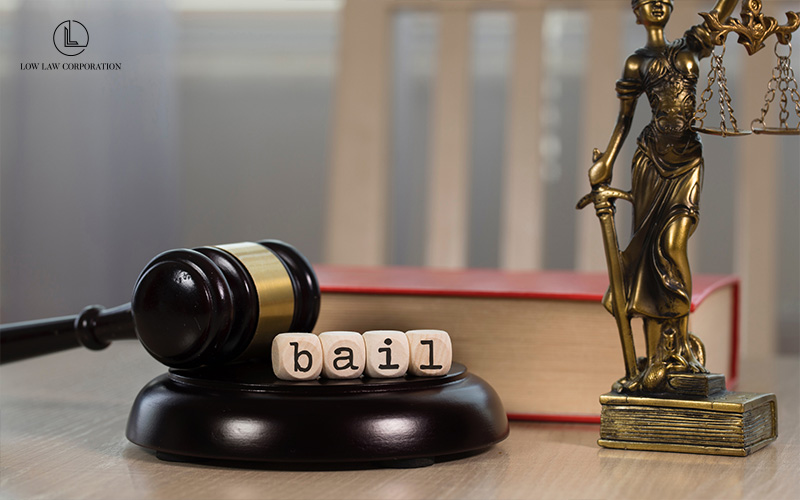
Introduction
If you’re a fan of procedural dramas, you’ve likely encountered the term “post bail.” But what does it really mean? In Singapore, bail refers to the temporary release of an accused person from custody, granted by law enforcement officers under specific conditions. This release ensures that the accused is under the responsibility of an individual — known as the surety — who guarantees the accused’s appearance in court or their cooperation with investigations as required. This article will detail how bail works, the different types of bail, and the factors influencing whether bail is granted.
An Overview of Bail in Singapore
Definition and Purpose of Bail
Bail is a legal arrangement involving property or funds pledged or deposited by an individual, called the surety, as a guarantee that a person released from custody will return to a police station or court at a specified date and time. The bail arrangement ensures that the accused remains present throughout the legal proceedings against them.
The concept of bail plays a part in maintaining the presumption of innocence, affirming that the accused is innocent until proven guilty. As such, unless there are compelling reasons to deny release, the accused should be allowed to remain out of detention pending trial. However, to mitigate the risk of the accused absconding, the bailor (the individual providing the bail) is responsible for ensuring that the accused adheres to the conditions set by the court.
-
Types of Bail
Each type of bail operates under distinct circumstances and conditions. Understanding them is essential for addressing specific needs and situations during the legal process.
1. Police/Agency Bail
This type of bail is granted by the police or relevant law enforcement agencies immediately following an individual’s arrest but before formal charges are filed in court.
2. Court Bail
Once formal charges are filed, any previously granted police or agency bail is typically revoked. At this stage, the court will consider court bail conditions.
-
Who Can Be a Surety?
A surety is an individual or entity that provides a guarantee for the appearance of an accused person in court or during legal proceedings. In the context of bail, the surety pledges their own assets or finances to ensure that the accused adheres to the conditions of their release. Bail surety requirements include the following:
- Be a Singapore citizen or permanent resident (unless specified otherwise by the court).
- Be at least 21 years old.
- Not be bankrupt.
- Not be a co-accused in the same proceedings as the accused.
- Not be the subject of any other pending or ongoing criminal charges in the State Courts and the Supreme Court.
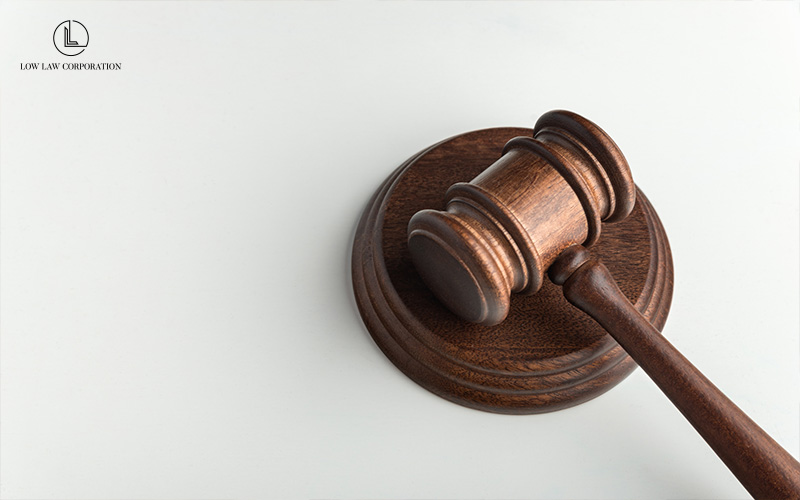
Even if a potential surety meets these conditions, they must still convince the court that they can fulfil their duties satisfactorily before their application for a surety is approved. For more detailed information, seek professional advice from reputable criminal lawyers in Singapore.
Can a Surety Be Discharged Before the Case Is Concluded?
A surety has the option to apply for discharge at the accused’s next court hearing. However, if the surety wishes to be discharged sooner, they can request an earlier hearing by writing to the State Courts through the link provided at go.gov.sg/writetosgcourts. The scheduling of an earlier date is subject to the court’s availability.
To proceed with the discharge, the surety must attend the court hearing in person alongside the accused and formally apply to be released from their role. It is the surety’s responsibility to ensure the accused is present when the application is made. Once the court grants the discharge, the surety’s obligations will cease.
At this point, the accused will need to propose a replacement surety. If a new surety is not arranged or their application is not approved by the court, the accused will be taken into custody until an appropriate substitute is found.
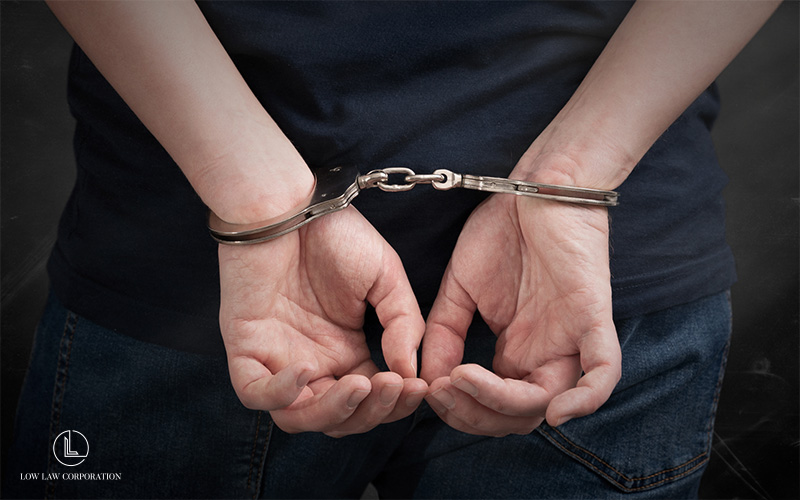
Bailable vs Non-Bailable Offences
Generally, an accused person can be released on bail before formal charges are filed. However, not all offences are eligible for bail in Singapore. The decision to grant or refuse bail — especially for non-bailable offences — rests with the court. The process involves assessing whether bail should be granted based on the case’s circumstances.
To ascertain if an offence is bailable or non-bailable, one can refer to the First Schedule of the Criminal Procedure Code. Examples of bailable offences include:
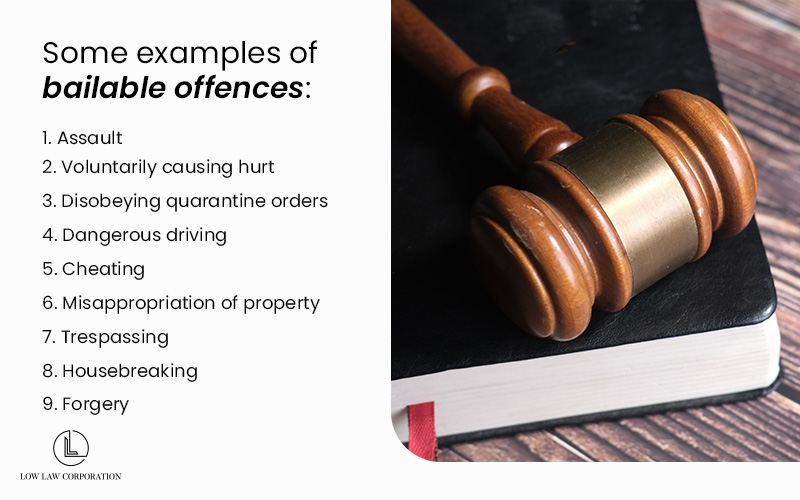
- Assault
- Voluntarily causing hurt
- Disobeying quarantine orders
- Dangerous driving
- Cheating
- Misappropriation of property
- Trespassing
- Housebreaking
- Forgery
Consequences of Non-Bailable Offences in Singapore
Non-bailable offences in Singapore, such as murder or drug trafficking, are treated with utmost severity due to their impact on society. Here’s what to expect if you or someone you know is involved in such cases.
Immediate Detention
When charged with a non-bailable offence, the accused is typically detained in police custody until a court decides otherwise. Bail is rarely granted unless exceptional circumstances are proven.
Court’s Discretion on Bail
While these offences are termed “non-bailable,” this doesn’t mean bail is entirely prohibited. The court evaluates factors like the nature of the crime, risk of flight, and potential harm to the public before granting bail.
Prosecution’s Role in Bail Decisions
The prosecution may strongly oppose bail, especially if there’s a likelihood of evidence tampering or witness intimidation by the accused.
Potential Bail Conditions
If granted, bail for non-bailable offences often comes with stringent conditions, including electronic monitoring and restrictions on communication.
When Can the Court Refuse Bail?
Even if an offence is deemed bailable, the accused may not be released immediately. The court can deny criminal proceedings bail or a personal bond under certain conditions, such as:
- The accused faces a criminal charge punishable by a sentence exceeding a fine.
- There are valid reasons to believe the accused will not comply with custody requirements, attend necessary investigations, or appear at scheduled court hearings.
Several factors influence the court’s decision to refuse bail, including:
-
Residency Status
The accused’s ties to the community can impact the likelihood of absconding.
-
Personal Background
Previous criminal history or character references may weigh heavily on the court’s decision.
-
Nature of the Offence
Seriousness and circumstances surrounding the alleged crime can influence bail considerations.
-
Risk of Absconding
If there is evidence suggesting that the accused may flee, the court may deny bail. If necessary, seek criminal lawyer advice for better clarity.
The Bail Application Process
When an individual is arrested in Singapore, they may find themselves in remand until their court date unless a bail bond is posted. Bail is a key mechanism that allows the accused to secure their temporary release from custody under specific conditions. This section discusses the bail application process, shedding light on how a bailor posts bail, how the bail amount is determined, the conditions associated with bail or personal bonds, and the possibility of appealing bail decisions.
How Does Bail Work
Bail is an integral part of Singapore’s criminal justice system, here’s how it functions:
Bail Process:
1. Granting Bail: When a person is charged, they may be offered the option to post bail, which involves pledging property or depositing money as a financial guarantee.
2. Role of the Bailor: A bailor (often a friend or family member who meets certain criteria) guarantees this amount, ensuring the court that the accused will comply with all legal requirements.
Consequences of Non-Compliance:
• Forfeiture of Bail: If the accused fails to meet the conditions of the bail, including appearing in court, the bailor risks losing the pledged money or property.
• Additional Charges: The accused may face further charges for breaching bail conditions.
How a Bailor Posts Bail
Once the court grants bail, the bailor must follow a structured process to post bail. Here are the steps involved:
Step 1: Visit the State Court Bail Centre
The bailor must visit the State Court Bail Centre during its operating hours to initiate the bail process.
Step 2: Prepare Necessary Documents
The bailor needs to gather specific documents to facilitate the application. These include:
- Identity card or passport
- The accused’s passport
- Evidence of the value of personal assets you intend to pledge (If requested by the court)
Step 3: Meeting with a Bail Officer
Upon arrival, the bailor will meet with a bail officer, who will guide them through the application process.
Things to Note:
- The application to be a bailor must be submitted during the Bail Centre’s operating hours.
- If the magistrate approves the application, the Bail Centre will process the bail, and the accused will be released.
Determining the Bail Amount
The bail amount is not arbitrarily set; it is determined based on various factors, primarily indicated by the prosecution. The court may follow this indication or adjust it based on objections from the accused or their counsel. The factors considered in determining a reasonable bail amount include:
1. Type of offence
— the nature of the charges.
2. Severity of the offence
— the likely sentence upon conviction, including any mandatory minimum sentences.
3. Number of charges
— multiple charges can lead to a higher bail amount.
4. Antecedents
—the accused’s previous criminal record or history.
5. General character of the accused
— an overall assessment of the accused’s character.
6. Personal factors
—individual circumstances and the means available to the accused to raise bail.
7 .Flight risk
—the likelihood that the accused may attempt to flee.
Engaging a criminal lawyer is vital for securing a favourable bail outcome. They can advise the accused on the factors that influence bail decisions and advocate for a reasonable bail amount.
Leaving Singapore While on Bail
One of the most common questions from accused individuals is, “Can I leave the country while on bail?” In Singapore, the general rule is that travel outside the country is not permitted unless the court grants explicit permission. When bail is approved, travel documents are usually surrendered to ensure the accused remains within jurisdiction until the conclusion of the case.
However, there are exceptional circumstances where the court may allow an accused person to travel overseas during an ongoing case. Such applications must be filed through your lawyer and supported by strong justifications, such as:
– Compelling personal reasons – e.g. medical treatment or urgent family matters.
– Professional obligations – business trips that are critical and cannot be delegated.
– Educational commitments – examinations or academic programmes overseas.
Approval is not automatic. The court evaluates each application based on factors such as the severity of the charges, risk of absconding, and the necessity of travel. In some cases, stricter bail conditions may be imposed, including an increase in bail amounts or additional sureties.
For example, in high-profile cases like the one involving former Transport Minister S. Iswaran, the court allowed overseas travel under specific restrictions and heightened bail conditions.
Before making any travel-related requests, always seek guidance from an experienced criminal defence lawyer to ensure compliance with all bail conditions and avoid the risk of bail being revoked.
Understanding Monetary vs. Non-Monetary Bail
Bail can be categorized into monetary and non-monetary types, each serving the purpose of ensuring the accused complies with legal obligations.
Monetary Bail
This requires a financial guarantee, either deposited in cash or secured by assets, to ensure the accused’s return to court. The amount depends on the severity of the charge and the accused’s financial standing.
Non-Monetary Bail
In this type, the accused is released based on personal recognizance or other conditions without a financial deposit. Conditions might include travel restrictions, regular check-ins with authorities, or surrendering travel documents.
Key Differences
Monetary bail directly involves financial commitments, while non-monetary bail emphasizes compliance through monitoring or restrictions. Courts decide based on the accused’s risk profile and the nature of the offense.
Conditions of Bail or Personal Bond
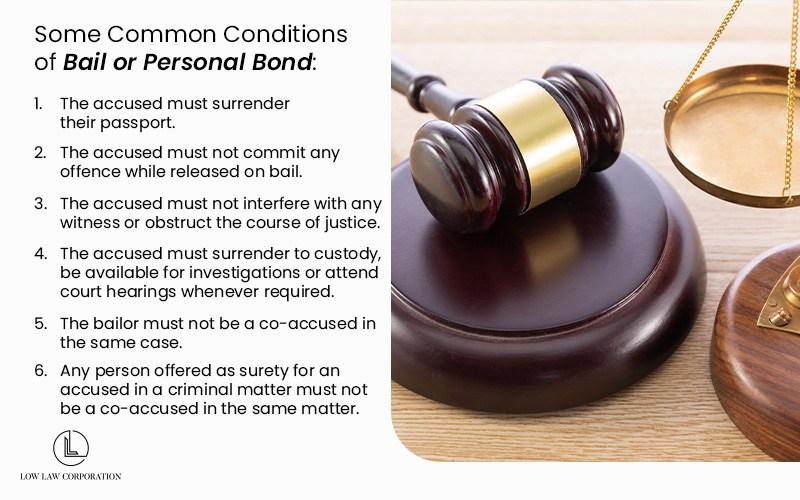
Under Section 94 of the Criminal Procedure Code, several conditions must be met for the accused while released on bail. These conditions typically include:
- The accused must surrender their passport.
- The accused must not commit any offence while released on bail.
- The accused must not interfere with any witness or obstruct the course of justice.
- The accused must surrender to custody, be available for investigations or attend court hearings whenever required.
- The bailor must not be a co-accused in the same case.
- Any person offered as surety for an accused in a criminal matter must not be a co-accused in the same matter.
Additionally, the court may impose further conditions, such as:
- Prohibiting contact with victims; and
- Implementing electronic tagging of the accused.
Consequences of the Accused Failing to Attend Court
If the accused, after being released on bail, fails to attend court as required without a valid reason, the court may issue a warrant for their arrest. Meanwhile, the surety will receive a notice to attend a “Show Cause” hearing, where they must explain why the full bail amount should not be forfeited.
If the court finds the surety’s explanation unsatisfactory and determines that they have not fulfilled their responsibilities, the court may order the forfeiture of the entire or part of the bail sum. Should the surety fail to pay the forfeited amount, they could face imprisonment for up to 12 months.
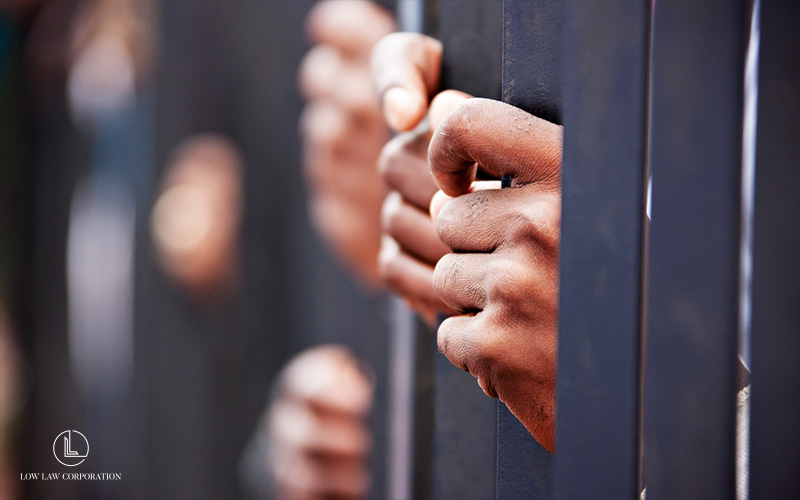
Appealing Bail Decisions
In Singapore, bail decisions made by the police or the court cannot be appealed directly. However, the bailor has the right to appeal to the General Division of the High Court through a criminal motion. This appeal can seek to alter either the bail amount or specific bail restrictions imposed by the court.
Seeking legal advice from dependable criminal lawyers ensures that the appeal is backed by strong legal arguments, thereby increasing the chances of winning. Their expertise fully upholds the accused’s rights during the bail process.
Frequently Asked Questions
1. Can I Leave The Country While On Bail In Singapore?
Leaving the country is not allowed unless explicitly permitted by the court. Travel documents are typically surrendered as part of the bail conditions to prevent absconding.
2. What are the other restrictions and conditions for persons released on bail?
Persons on bail must adhere to conditions such as regular reporting to the police and avoiding contact with witnesses. Non-compliance can lead to bail revocation.
3. What should I bring to my first consultation with a criminal lawyer?
For your first meeting, bring any relevant documents related to your case, such as the police report, charge sheet, bail information, and any communication with law enforcement.
4. How much does it cost to hire a criminal lawyer in Singapore?
Legal fees may vary depending on the complexity of the case, the lawyer’s experience, and the time required to prepare and present your defence. It’s advisable to discuss costs upfront.
5. How long does the bail process take?
The time it takes to process bail depends on various factors, such as the complexity of the case and the court’s schedule. However, once bail is approved, the process can typically be completed on the same day.
6. Can I change my lawyer after the case has started?
Yes, you can change your prosecution lawyer at any stage of the case. However, it’s important to inform the court and your current lawyer as soon as possible to ensure a smooth transition.
Conclusion
Navigating the bail process in Singapore can be a daunting experience, especially for individuals unfamiliar with the legal system. Understanding how bail works, the responsibilities of a bailor, and the various factors influencing bail amounts is crucial for anyone involved in criminal proceedings.
Seeking guidance from a criminal law specialist can help ensure that you meet all legal requirements while protecting your rights.
Bail upholds the presumption of innocence, allowing accused individuals to be released from custody while awaiting trial. However, it also comes with strict conditions, ensuring that the accused remains accountable and cooperates with the judicial process. If you require expert legal assistance, our team at Low Law Corporation can provide the necessary guidance and representation.
Why Choose Low Law Corporation?
The role of a criminal defence lawyer in Singapore cannot be overstated when it comes to managing bail. Expert legal advice is a key element in presenting a strong case for reasonable bail terms and amounts, especially when the risk of flight or other concerns may arise.
For those in need of top-notch legal representation, consider Low Law Corporation. We take pride in guiding clients through the complexity of the bail process and ensuring a strong defence. Contact us now and let us render the best possible support throughout your legal journey.
